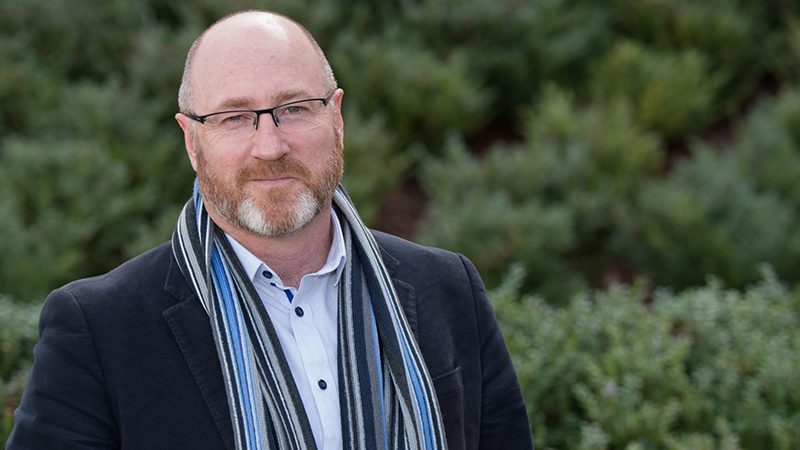UNSW’s final Grand Challenge: Thriving in the Anthropocene
UNSW's last Grand Challenge will focus on how humans can thrive in our contemporary, globalised world.
UNSW's last Grand Challenge will focus on how humans can thrive in our contemporary, globalised world.

UNSW's last Grand Challenge will focus on how humans can thrive in our contemporary, globalised world.
UNSW’s Grand Challenge on Thriving in the Anthropocene will initiate a public discussion on the challenges and opportunities that living in the Anthropocene epoch creates. The wide range of topics will include global public health, the fate of the Earth's biodiversity, sustainable consumption and energy systems, climate change and the potential for smart new green economies.
Grand Challenges Academic Lead Scientia Professor Rob Brooks says he wants the conversations to project a tone of modest optimism, and to harness the energy and ingenuity of a university community that has been largely reacting to crises since late 2019.
“Since UNSW chose Thriving in the Anthropocene, we have experienced a bushfire season of unprecedented scale and intensity, making plain the urgency of both addressing the causes of climate change and its consequences,” Prof. Brooks said. “Then the COVID-19 pandemic disrupted global society, economies and the 2020 academic year. The challenges to thriving in our contemporary, globalised world have never been starker.
“Given the financial difficulties experienced by the higher education sector, the Grand Challenges program of activity will conclude at the end of 2020. Despite the dramatic irony of 2020’s decidedly Anthropocene problems shortening this new Grand Challenge, we believe UNSW will embrace this chance to consider how humanity might go on to thrive in this challenging new epoch,” Prof. Brooks said.
“Each Grand Challenge has been built by establishing networks and new interdisciplinary communities that live on long beyond the finite funding period. Thriving in the Anthropocene will be no different.”
Thriving in the Anthropocene is seventh in UNSW’s Grand Challenges program, which identifies, explores and addresses the most important issues facing, or likely to face, humanity. Each Grand Challenge engages scholars, policymakers and the public through a series of critical discussions, debates, events and activities. Topics are wide ranging and have included refugees and migrants, inequality, living with 21st-century technology and trust.
Thriving in the Anthropocene will build on the foundation laid by the Climate Change Grand Challenge which ran from 2015-2017. That Challenge highlighted the growing awareness that human activities have forced all the living world into a new geological epoch.
The Grand Challenge on Thriving in the Anthropocene is being co-led by Deputy Head of the School of Psychology Professor Ben Newell, UNSW Sydney and Professor Anthony Burke, Deputy Head of School of Humanities & Social Sciences, UNSW Canberra.
Prof. Newell insists that the Anthropocene means business not as usual.
“Both the bushfires and the pandemic are a result of the ways in which we now live on this planet and they are both clarion calls for the unsustainability of business as usual. The Anthropocene means business not as usual,” Prof. Newell said.
“The key idea of the Anthropocene is that it is a period of our history in which our existence is having a profound effect on the Earth. Acknowledging that human activity has pushed our world into this new epoch entails the realisation that it is only through fundamental behaviour change and adaptation that we will survive and thrive in the years, decades, and centuries to come.”
Prof. Newell’s background is in Experimental Psychology, which focuses on the factors underlying people’s judgment and decision making. As such he is interested in why people do the things they do.
“A key priority for me is to view the Anthropocene through the lens of Behaviour Change. What are the strategies, interventions and policy directions that will overcome disengagement, apathy and the fear of ‘not being able to make a difference?’ How do we break out of our tendency for myopic, present-biased thinking and dedicate our minds to a future focus?”
As co-lead of the Grand Challenge, Prof. Newell is keen to see an inclusive, University-wide celebration of ideas, debate and discussion all focusing on the challenges and opportunities that the Anthropocene epoch has presented us with.
“I am particularly keen to get students engaged. The Anthropocene is their epoch and they need to be central to our thinking. I’d like to see engagement across all media: talks, podcasts, video, opinion pieces, interactive web-presence and live debate – virtual or otherwise!”
“In the last decade,” says Professor Anthony Burke, “the Anthropocene has moved from an obscure proposal to declare a new geological epoch to sweep across the humanities and social sciences as a profound focus of concern about humanity's future and its relationship to the Earth. It has been featured on the covers of The Economist and Nature and in speeches by the German Chancellor Angela Merkel.”
As a scholar of political theory, international relations and law, Prof. Burke says his key interests are in the challenge that the Anthropocene poses to political and governance systems, from public health to international security and the global environment.
“Whether we think of the climate and biodiversity crises, fire and food security, or the way COVID-19 has spread so rapidly from nonhuman species across our tightly globalised societies," says Prof. Burke, “the Anthropocene touches all of our lives.
“This demands interdisciplinary conversations in which the community is involved. We need social and natural scientists, philosophers, doctors, soldiers, businesspeople, lawyers, artists, writers, parents, youth and citizens to understand what is at stake and join in the search for solutions.
“As well as acknowledging the anxieties of the Anthropocene, now is an opportunity to build public engagement around the opportunities it provides to solve major problems and put better systems in place. We want this Grand Challenge program to be a platform for hope, innovation and positive institutional change.”
Learn more about UNSW Grand Challenges.